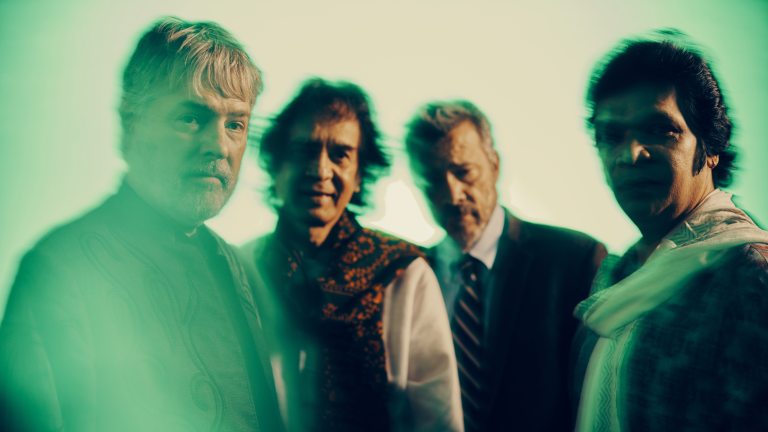
Longwood Debut
Banjo legend Béla Fleck, renowned tabla player Zakir Hussain, the great double bassist Edgar Meyer, and bansuri player Rakesh Chaurasia come together in a dynamic collaboration that encompasses their gift for improvisation and ability to reach across musical genres.
The group glides easily between the cerebral complexity of Indian rhythm and the gut-level groove of a funky bass line, sounding equally at home with the rigors of raga. But the first time Fleck, Hussain, and Meyer got together to make an album, it was to write, not to play. When Fleck and Meyer were looking for a third partner for a triple concerto, which they had been commissioned to write to mark the opening of Nashville’s Schermerhorn Symphony Center, they thought of Hussain, who was quite interested in orchestral writing. “We thought we could learn a whole lot from this guy!” says Fleck. The result was The Melody of Rhythm (2009), recorded with the Detroit Symphony Orchestra under Leonard Slatkin.
It wasn’t until the three began touring to promote the album that the trio’s true potential became apparent, as casually as neighbors might chat over a backyard fence. “When we are performing on stage, in composing mode or creating mode, we are basically having a conversation,” says Hussain. “So, the music emerges as we speak.”
Their three-time Grammy-nominated album As We Speak showcases the quartet’s breathtaking abilities as instrumentalists and composers and underscores the wide range of influences at their command.
Adding to that magic is Chaurasia, who plays bansuri, an Indian bamboo flute. When the trio was touring India, Hussain—who knew Chaurasia through his uncle, Indian flute legend Pandit Hariprasad Chaurasia—invited the younger flautist to sit in, and the chemistry was immediately apparent. “I think we wanted to see if we could do something a little more organic with just a small group,” says Meyer. “And to have somebody who plays as beautifully as Rakesh join us really opened it up to a more lyrical and melodic situation.”
“What I think is good about this quartet is that everybody has to stretch in the direction of the other people,” adds Fleck. “To me, a collaboration where nobody changes is not a collaboration. It’s a mashup. And there’s nothing wrong with that. But I like a collaboration where I have to learn a bunch of new things from the other people. And in this case, I’m learning like crazy.”
Béla Fleck
Few musicians in any category seem as uncategorizable as Béla Fleck. After initially making his mark with the progressive bluegrass group New Grass Revival, Fleck proceeded to take his instrument, as The New York Times critic Jon Pareles noted, “to some very unlikely places.” He formed the Flecktones, a groundbreaking group whose repertoire ranged from fusion to Bach; the group celebrates its 46th anniversary this year. In addition, he has played jazz with Chick Corea; American roots with his partner, banjoist Abigail Washburn; written concertos for banjo and orchestra; and created a documentary film and album, Throw Down Your Heart, that examined the banjo’s African roots. Along the way, he has won 16 Grammy Awards across 10 categories.
Zakir Hussain
The pre-eminent classical tabla virtuoso of our time, Zakir Hussain is appreciated as one of the world’s most esteemed and influential musicians—one whose mastery of his percussion instrument has taken it to a new level, transcending cultures and national borders. A child prodigy, accompanying India’s greatest musicians and dancers from his early years, and touring internationally while still in his teens, Hussain has been at the helm of many genre-defying collaborations including Shakti, Remember Shakti, Masters of Percussion, Diga, Tabla Beat Science, CrossCurrents, Sangam and Grammy Award-winners Planet Drum and Global Drum Project. A revered composer and educator, Hussain is the recipient of countless honors, most recently the 2022 Kyoto Prize in Arts and Philosophy, the 2022 Aga Khan Music Award for Lifetime Achievement, and in January 2023, the title of Padma Vibhushan, India’s second highest civilian award.
Edgar Meyer
Aptly described by The New Yorker as “the most remarkable virtuoso in the relatively un-chronicled history of his instrument,” double bassist and composer Edgar Meyer is at home in a broad spectrum of musical styles. A MacArthur Fellow and Avery Fisher Prize winner, he is eminently at home within classical music, both performing traditional works and also his significant catalog of original solo, chamber, and orchestral pieces. His 30-year relationship with Yo-Yo Ma has yielded seven recordings together, and his upcoming projects include a duo recording with jazz bassist Christian McBride and a recording of all four of his concertos with the Knights and the Scottish Ensemble, produced by Chris Thile.
Rakesh Chaurasia
Like Zakir Hussain, Rakesh Chaurasia comes from Indian classical music royalty. His uncle, Pandit Hariprasad Chaurasia, is widely considered the greatest bansuri player in India, and Chaurasia—who started playing at age five—is deemed his most brilliant student. Not only has he mastered the techniques of Indian classical music, he has developed additional techniques allowing him to venture into other styles of playing, particularly with his crossover band Rakesh and Friends. A composer as well as flautist, he has written and performed on numerous Indian movie soundtracks, and in 2007 was awarded the Indian Music Academy Award.